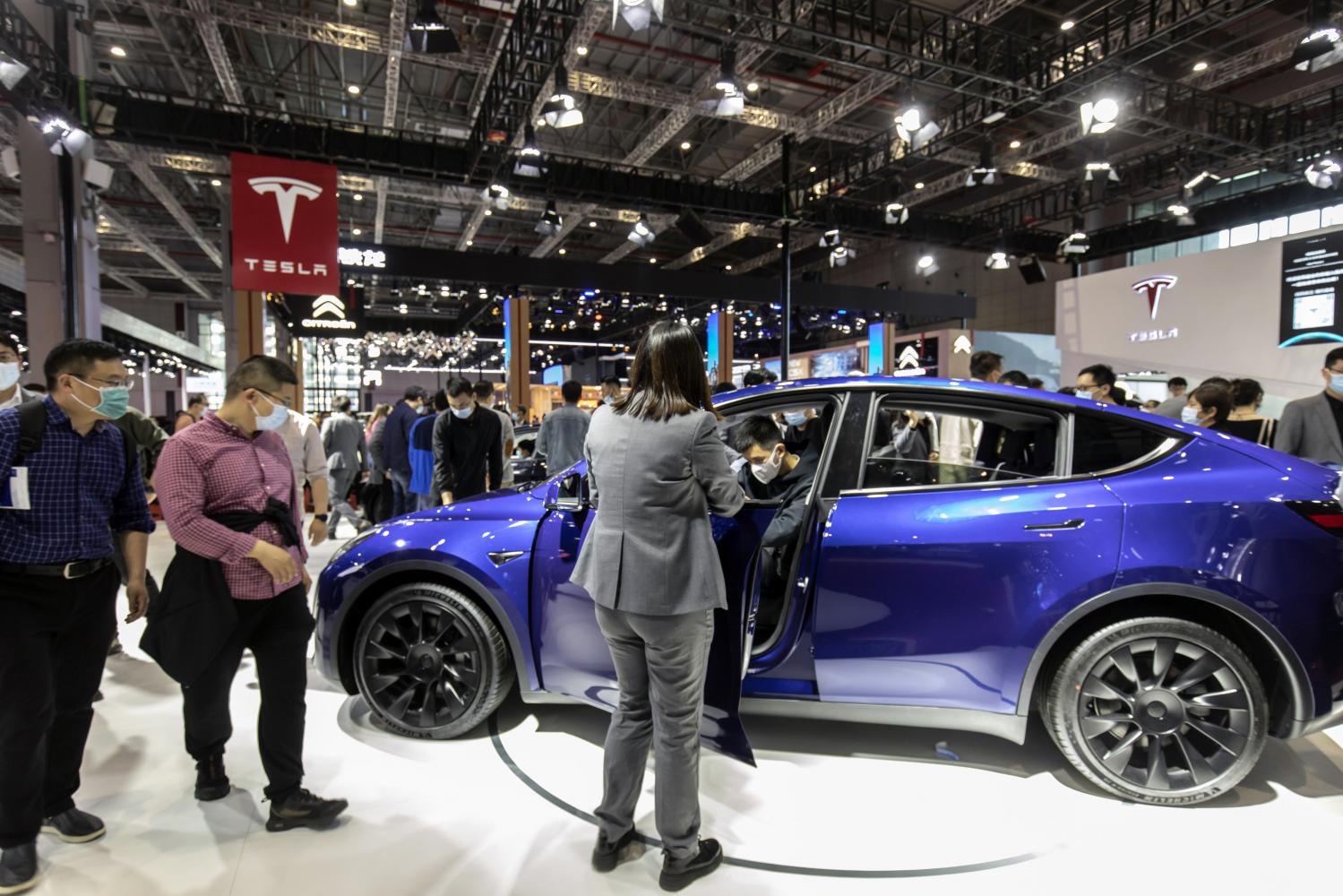An EV charging station at a motor show. ASPS research predicts significant long-term growth in the EV market. (Photo by Patipat Janthong)
If the world is to fight climate change, the automotive market must accelerate its transition from gas-guzzling internal combustion engines to electric ones, based on innovative breakthroughs in battery technology.
This means massive government and private sector investments in automotive, battery, and other technologies, opening up myriad opportunities for savvy investors to capitalize on a trend that could prove beneficial to the world.
According to Asia Plus Securities (ASPS) Investment Research, the EV industry is expected to experience significant growth over the long term.
The global share of electric cars now makes up only 4-5% of all vehicles produced, but is expected to increase to 10% by 2025 and to 28% by 2030.
In light of these statistics, ASPS recommends long-term investments in EV stocks or other products in order to capitalize on the promising growth potential of the industry.
To encourage the manufacture and public acceptance of these vehicles, the US and Chinese governments have invested in EV charging infrastructure projects and subsidized the private sector to reduce production costs while incentivizing the purchase of electric cars through tax cuts to accomplish.
According to ASPS, the US electric car industry, the world leader in EV innovation and technology, will benefit greatly from the US government’s $ 2 trillion infrastructure investment plan to reduce carbon emissions and the Strengthen supply chains for automotive companies.
The industry is also expecting a boost from government policies that offer tax breaks to anyone who buys an electric vehicle.
Auto parts and batteries for electric vehicles are becoming more advanced and efficient. Lower production costs and battery prices should result in cheaper electric vehicles, which could spur growth in the industry in the future.
“Interesting overseas EV stocks now include Tesla and Chinese EV manufacturers,” said Krittayaporn Dhadasih, head of global investment at ASPS.
“Thai investors can invest directly in these stocks through Thai investment firms or foreign mutual funds.”

TESLA ABOVE
Given its dominance of the market, Tesla Inc is undoubtedly the world’s leading manufacturer of electric cars, posting net income for several consecutive quarters.
Although the company only had 500,000 electric vehicles shipped in 2020, Tesla’s market value is still higher than that of many large auto companies combined, Ms. Krittayaporn said.
The electric vehicle industry in China is also booming, which is reflected in the country’s increased electric car sales in recent years.
Although most Chinese electric vehicle-related companies are still making net losses, these companies should continue to produce electric vehicles until manufacturing costs come down, which means profits should follow soon, she said.
The Thai government had previously put in place a policy to support electric vehicle production, stimulate domestic demand, and set targets to increase consumer usage.
On March 24, the Department of Energy’s National Electric Vehicle Policy Committee held a meeting to set the vision and goals for electric vehicles aimed at using zero-emission vehicles powered by batteries.
The committee aims to have 30,000 battery and fuel cell electric vehicles on the road by 2022, 225,000 electric vehicles by 2025, 440,000 electric vehicles by 2030 and 1,150,000 electric vehicles by 2035.
ASPS sees the policy as a boon to domestic electric vehicle battery and electric car manufacturers.
“This is a long-term plan with goals that will be progressively implemented over the next 14 years so that short-term gains have not yet materialized,” said Therdsak Thaveeteeratham, executive vice president of ASPS.
“Due to government support, however, the long-term goals are still foreseeable.”

Visitors will see a China-made Tesla Model Y at Auto Shanghai on April 27, 2021. Bloomberg
BANKS ON BATTERIES
Many companies in Thailand are currently making batteries for electric vehicles, including some companies listed on the Thai Stock Exchange that have made significant investments in manufacturing, including Energy Absolute (EA), Global Power Synergy (GPSC), Banpu (BANPU), and Banpu Power (BPP).
EA is widely recognized as the largest renewable energy producer in the country and a leader in the battery business. The company invests in the battery business through its subsidiary Amita Taiwan, in which EA holds around 70%.
Amita Taiwan is a manufacturer of lithium-ion batteries with a capacity of 400 megawatt hours (MWh) and supplies customers in the Taiwanese automotive industry.
EA plans to enter the electric vehicle battery market and expects to begin production and ship products to customers by the middle of this year.
The company also plans to manufacture storage batteries for renewable energy systems in the EA Group.
If battery production goes well in the first phase, the company plans to increase production capacity to 49,000 MWh in the next phase.
GPSC, a PTT subsidiary, has been identified as an integral part of the state-owned oil and gas company’s S-curve strategy.
The company launched a pilot project to build a 30 MWh prototype battery factory using semi-solid technology, an innovation in the manufacture of lithium-ion batteries that is designed to cut production costs.
The project uses 24M Technologies Inc, in which GPSC has an 18% stake.
GPSC also has an 11.1% stake in Anhui Axxiva New Energy Technology Co. (AXXIVA) in China, a manufacturer of batteries with a planned capacity of 1,000 MWh.
Axxiva’s plant is under construction and is expected to be completed this year. Main customer groups in China will be supplied to the EV industry by 2022.

Cars exhibited at the Bangkok International Motor Show last month. Varuth Hirunyatheb
TO WIN CAR PARTS?
In addition to battery inventories, auto parts inventories should benefit from the growth of the electric vehicle industry, according to research by Yuanta Securities Thailand.
The prospect for auto parts companies to do business this year is good, the broker said.
Yuanta Securities predicts that industry profits will increase 104% year over year, based on a 10% year-over-year recovery in auto production this year. This assumption translates into 1,570,000 car sales in 2021.
“The automotive industry is moving towards a decade of electric vehicles in line with changing global trends,” said Yuanta Securities.
While government policy is to increase the production rate of electric vehicles to 30% of the total, this trend can be both a disruption and an opportunity for auto parts manufacturers, depending on the reactions of car owners, the broker said.
Yuanta Securities recommends giving more weight to investments in the auto parts segment and expects the industry to enter a turnaround phase, with remarkable growth from 2021 to 2022 due to a low earnings base over the past year.
The brokerage sees the industry at a tipping point as the growing trend in the EV market pushes companies to adapt over the long term.
Yuanta Securities said while some operators view the EV trend as a disruption, these publicly traded companies see an opportunity for growth in it: Thai Stanley Electric (STANLY), Interhides (IHL) and Inoue Rubber (Thailand) (IRC).
“The EV theme is an interesting long-term investment theme with excellent growth potential,” stated the broker.

